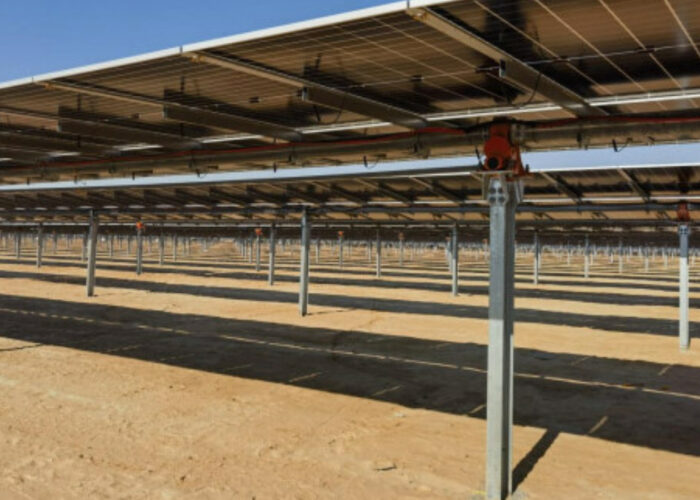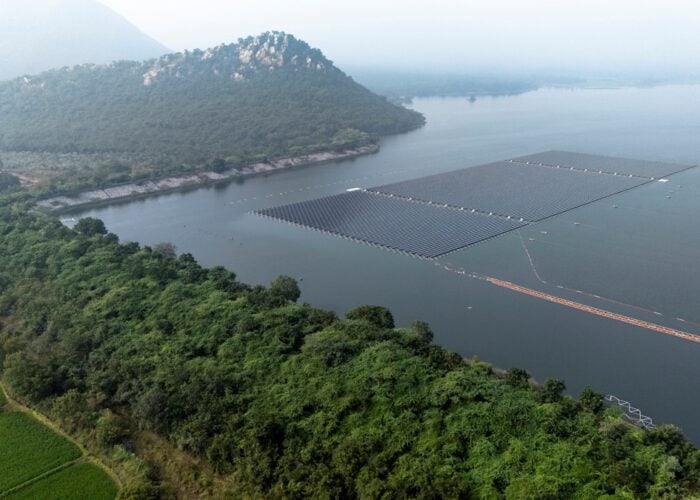This week, thin-film manufacturer and utility-scale PV plant developer First Solar revealed its 50MW Macho Springs project in New Mexico had become the first of its kind to receive a Quality Tested certification from testing institutes VDE and Fraunhofer ISE.
Quality assurance certifications are commonplace at a module level, but a new development for PV power plants, reflecting the extent to which they have caught the attention of serious investors. At Solar Power International in Las Vegas this week, PV Tech spoke to Azmat Siddiqi, First Solar’s senior vice president of quality and reliability, and John Sedgwick, president of VDE Americas, for some insights into how the certification was achieved and how it will drive up standards in the PV power plant business.
Try Premium for just $1
- Full premium access for the first month at only $1
- Converts to an annual rate after 30 days unless cancelled
- Cancel anytime during the trial period
Premium Benefits
- Expert industry analysis and interviews
- Digital access to PV Tech Power journal
- Exclusive event discounts
Or get the full Premium subscription right away
Or continue reading this article for free
PV Tech: First Solar is already a respected player in the PV power plant business. Why was this certification step felt to be necessary?
Azmat Siddiqi: As we pursue excellence and quality in all our operations and all our endeavours, it’s very important to raise the bar in the industry. So this was not just for First Solar, but to raise the bar in the industry.
John Sedgwick: We’re clearly seeing the industry trend now towards what are more normalised financing mechanisms, and when that happens you need standardised certifications for plants. And we’re leaning, almost pulling the industry along to something that’s quite standard in other industries. In other industries when you have a US$100 million asset, you have a certification on that asset saying everything’s fine; in the solar industry we’re not children, but we’re maybe young teenagers.
PV Tech: Is this certification a reflection of the changing nature of the investors now being attracted to solar and what they’re demanding?
JS: Absolutely. What we’re seeing is that there’s been a change in the way these assets are financed, where they’re no longer based on tax equity or feed-in tariffs. They’re going to be financial assets with traditional IRRs, and so banks are going to want to see certification to reduce risk; insurance companies will want to see these for reduced risk. It’s just a maturing process in the industry is happening now.
PV Tech: What does the actual certification process look at?
JS: It’s a very comprehensive analysis of the plant. It checks everything, from documentation of the smallest component, all the way up to the high-end system. And so it really certifies that that plant is a world-class, world-standard, highest-quality solar PV financial asset. So it’s a very comprehensive analysis.
AS: There are over 300 different areas of focus, attention and certification in the process; it’s a very comprehensive programme. Throughout our value chain, we try to put these new practices of technology readiness in place, so right up to commission, we’ve got these internal practices; now is the best time to have them certified.
PV Tech: How long does it take to do one of these tests?
JS: It’s usually about three to four months, depending on what stage the plant is at. You can start it as the plant begins construction, or you can do it in the middle, or you when it’s completed.
PV Tech: Do you anticipate that your competitors in the industry will follow your lead?
AS: I would certainly hope so. Raising that bar is where the real win for the industry is; when the industry’s acceptance of this certification becomes the norm, then we can all compete on our individual differentiators.
JS: Anything you do in the solar industry you have to drive costs down. And where we need to focus is on soft costs and financing, and perceived risk that financial lenders and insurance companies assign to solar assets. And when you get just a small movement, a little movement in that reduction, it has a very large impact on reducing the cost of the asset and thereby increasing the market that’s available to it.
PV Tech: Will First Solar’s intention be to do this for all projects in the future now?
AS: The intention will be there. It depends a lot on the individual customer and the intents there, but our intention is to make this a standard practice so we stand technically and financially behind all our projects and ensure we have met all the requirements.
PV Tech: Investors are increasingly driving the quality assurance process on the demand side of the market through third-party QA processes – can you see that happening at a PV system level?
JS: Yes, we are hearing from various financial institutions that at a systems level these kind of certifications more and more will be required as part of a financing package. It’s not there yet, but it’s going to become obvious that you need to have some level of risk reduction assurance that’s more organised.
PV Tech: Is this part of the industry’s growing up process?
AS: Yes, it’s about risk identification, classification and mitigation. Mitigation is the key.






